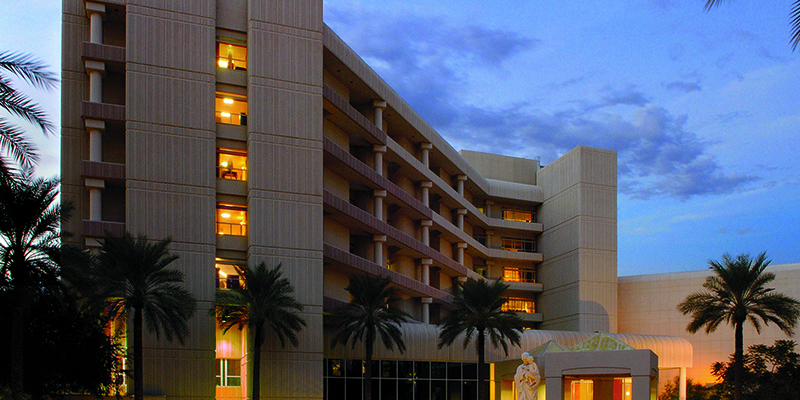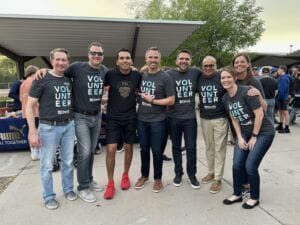The Flinn Foundation has honored the legacy of Dr. Robert S. Flinn at Dignity Health St. Joseph’s Hospital and Medical Center with a $1 million gift to establish a cardiology fellowship program in his name.
The grant to the Phoenix hospital was made in recognition of the 50th anniversary of the Foundation, created by Dr. Flinn and his wife, Irene, in 1965 to improve the quality of life in Arizona. The grant presentation took place Oct. 28 during a Flinn Foundation anniversary event at the Arizona Biltmore.
Dr. Flinn, a cardiologist and pillar of the medical community who was one of Arizona’s most influential physicians of his time, was affiliated with St. Joseph’s Hospital for about five decades, holding leadership positions and keeping an office there into his later years. The Foundation’s first grant in 1965 was for five cardiac-arrest carts and two EKG units for St. Joseph’s Hospital. More than $220 million in charitable distributions later, the Flinn Foundation chose to use its special anniversary gift to once again benefit the hospital’s cardiology department.
The grant, to establish and permanently endow the Dr. Robert S. Flinn Cardiology Fellowship Program at St. Joseph’s Hospital and Medical Center, will support promising new physicians who, having completed three-year internal-medicine residencies, will spend another three years in training in interventional cardiology, during which time they will also undertake a research project. The selection process to identify the first two Fellows has already begun, with the program scheduled to launch in 2016.
“In this very special year for the Flinn Foundation, we wanted to honor the legacy and vision of Robert and Irene Flinn by giving back to the hospital where Dr. Flinn built his reputation for excellence and leadership as a physician,” said Flinn Foundation President & CEO Jack B. Jewett. “But this is also a time to look ahead, and this gift for medical education and research is one that addresses Arizona’s long-term needs, and one that would make Dr. and Mrs. Flinn very proud.”
Patty White, President and CEO of the hospital, said: “This generous gift and the establishment of the Dr. Robert S. Flinn Cardiology Fellowship Program mean a great deal to St. Joseph’s and the advancement of our cardiology program. Most importantly, the gift ultimately will make a difference in the lives of patients who come to our hospital from throughout Arizona seeking hope and answers. Education and research are cornerstones of St. Joseph’s, so we could not be more appreciative and honored.”
Dr. Flinn was raised in Prescott, where his father, also a doctor, operated a renowned tuberculosis sanitarium. Robert Flinn attended Harvard Medical School and trained as a cardiologist. He returned to Arizona and after a brief stay in Prescott moved to Phoenix in 1930.
During his career, Dr. Flinn headed the departments of cardiology and electrocardiography at St. Joseph’s Hospital. He was chief of the medical staff at St. Joseph’s and at Phoenix Memorial Hospital, president of both state and county medical societies, and co-founder and first president of the Arizona affiliate of the American Heart Association. He was a strong advocate of the founding of the University of Arizona College of Medicine and of improving medical technology to better serve patients. Several of the Foundation’s early grants to UA helped to establish the medical school’s cardiology department.
In addition, Dr. Flinn also served as the unofficial house doctor at the Arizona Biltmore, where he treated celebrities and other well-known patients from around the world.
And while Dr. Flinn’s main interests focused on medicine and health care, Mrs. Flinn was a longtime supporter of the arts and education, which later became two of the Foundation’s four program areas. Mrs. Flinn preferred to be anonymous in her giving, refusing recognition or publicity. She came from a family of considerable wealth, and had previously been married to the chief financial officer of International Business Machines, adding to the resources that would help create the Flinn Foundation.
Robert and Irene Flinn married in 1952 and lived in the Biltmore Estates. Mrs. Flinn died in 1978 and Dr. Flinn died in 1984. Following the death of Dr. Flinn, the Flinn Foundation became for a number of years the largest private foundation in the state of Arizona.
Throughout the Foundation’s history, health care and medicine have held central positions in its grantmaking. In 2001, the Foundation narrowed its health-care focus to the advancement of the biosciences in Arizona. In addition to major bioscience grants, the Foundation oversees Arizona’s Bioscience Roadmap, launched in 2002 and updated last year through 2025 to guide the growth of the state’s bioscience sector.
“We are seeing great advancements in precision medicine, improved treatment options close to home for Arizona patients, and an emphasis on commercialization that is creating bioscience companies and jobs throughout the state,” said Dr. David J. Gullen, chair of the Flinn Foundation board of directors. “The Flinn Foundation has supported medical advances for five decades and is proud to continue this work today in addition to its support of arts and culture, education, and civic leadership.”
Along with grantmaking in the biosciences and the arts and culture sector, the Foundation contributes to the state of Arizona by administering two programs that invest in future leaders.
The Flinn Scholars Program offers comprehensive merit-based undergraduate scholarships to 20 premier Arizona high-school seniors each year to attend one of Arizona’s public universities. The 30-year-old program covers virtually all tuition, fees, room, and board, and provides international seminars and travel experiences, faculty mentorship, a leadership internship program, and other opportunities.
The Arizona Center for Civic Leadership, and its flagship Flinn-Brown Academy, identifies and develops future state-level civic leaders. Over its first five years, the program has equipped 224 Flinn-Brown Fellows with the knowledge, skills, and networks to respond effectively to Arizona’s long-term challenges.
In addition, the Flinn Foundation facility that opened in 2000 in central Phoenix includes two fully equipped conference rooms that are available to the nonprofit community free of charge.




